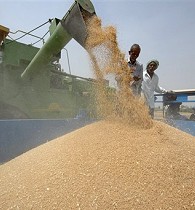New Delhi
14 July 2009
 |
| Wheat crop unloaded into tractor from harvesting machine at field near Sanand town, about 30 kilometers (19 miles) west of Ahmadabad, India (file) |
Less than two weeks ago, ample stocks of wheat lying in state granaries had prompted the government to relax a two-year ban on wheat exports.
But the ban was hurriedly re-imposed Monday, amid growing worries that deficient monsoon rains will reduce food grain output in a country where two-thirds of agriculture is fed by annual rains which come between June and September.
Concerns that wheat and rice production may suffer this year have become acute after the north of the country - known as the bread basket - has seen the driest June in decades. This month, the monsoon has picked up pace in the south and the west, but key wheat and rice producing regions, such as Punjab, Haryana and Uttar Pradesh, remain parched.
Wheat is sown in Winter. The low rainfall has depleted lakes and reservoirs, raising concerns that there may not be sufficient water to irrigate crops.
D.H. Pai Panindiker heads the independent economic research group, the RPG Goenka Foundation in New Delhi. He says the government has decided to hold on its food reserves to ensure there are no shortages in the months ahead.
"If we are, ourselves, short, then we cannot expect any exports. Of course, our stock position is comfortable. We have about 40 million tons of rice and wheat. But, obviously, we cannot export," he said.
In the last two years, the government has clamped down on exports of rice and wheat, to stave off shortages and control spiraling prices. Although India is the world's second-largest producer of wheat and rice, sufficient stocks of food grains are of paramount concern in a country of more than a billion people, nearly half of them poor.
Worries are not confined to wheat and rice alone. There are fears that production of crops such as cotton and sugar may also be affected because of the deficiency in rains.
The growing concerns over food production have prompted the prime minister to ask officials to monitor the progress of the rains, on a daily basis.
Economists say a poor monsoon will also derail plans by the government to push for higher economic growth this year.